Having worked as a vet for more than a decade alongside local farmers in his native Loughrea, Michael Burke spotted a gap in the Irish veterinary market in the early 1980s and backed himself to build a new business, despite having a very young family of five kids at a time when the Irish economy was in stagnation.
What Burke noticed was that a vet ordering a product from a multinational supplier could be left waiting for over a month to get it.
Burke established a new wholesale business on the main street in Loughrea, which was able to offer Irish vets delivery within 24 hours of placing an order. However, he was not prepared to stop there.
In 1985, Burke took his biggest risk when he established his first manufacturing facility on the outskirts of Loughrea making his own generic animal health products, based on medicines that have gone off patent. From these humble beginnings, the Chanelle Group has grown.
Global outlook
While very much a local success story (Chanelle Group carries the blue and yellow of the Loughrea GAA team), Chanelle is undoubtedly a company with a global outlook.
We develop a minimum of 15 to 20 generic products every year, whereas the multinational companies are developing just one or two products a year. On the veterinary side alone, we’ll launch 44 new products over the next four years
Still privately owned by Michael Burke, Chanelle Group today employs over 500 people across the business and exports to 96 countries around the world, with sales set to hit €130m this year.
“We’ve doubled our turnover in the last five years and we’ll double it again in the next five,” says Burke.
“Our focus on R&D is what’s driving this growth. We spend between €8m and €9m every year on R&D. And while that’s a big investment that comes straight off the bottom line, we have a brilliant pipeline of products coming through in the years ahead.”

The EU accounts for 80% of the group’s business, with small-animal products accounting for 50% of veterinary product sales.
Licensed products
Chanelle holds more than 2,000 animal health licences registered in the EU, which is the largest number held by any company in Europe, and more than 500 licences outside the EU.
The company is best known to farmers for its wide range of animal health products, including brands such as Albex, Animec Pour On, Bovex, Epromec, Rumenil, Chan Broad Spec, Ridafluke and Tribex. While manufacturing generic products for large animals is still a core part of Chanelle’s business, Burke says there has been huge growth in demand for small-animal health products. Sales of small-animal products now account for about 50% of total veterinary product sales.
While the EU accounts for 80% of the group’s business, markets such as Australia, New Zealand, Japan, South Africa and the Middle East are also important to Chanelle.
In the coming years, Burke is planning a major assault on the US market, having recently completed a €70m investment in expanding the company’s manufacturing capacity at the group’s 17.5ac site in Loughrea, as well as on new product development.
While Chanelle started out manufacturing generic animal health products, the company has since moved into the human health market. The global market for animal health products is valued at €25bn per annum, while the human health market is valued 50 times larger between €1.3tn and €1.4tn.
R&D pipeline
The focus on research and development in Chanelle is relentless. The company employs around 75 people to work on new product development from five specialised R&D laboratories, four of which are in Loughrea, with the fifth located in Jordan in the Middle East.
“R&D is a big focus for us because if we don’t have new products we’ll go nowhere,” says Burke.
“We develop a minimum of 15 to 20 generic products every year, whereas the multinational companies are developing just one or two products a year.
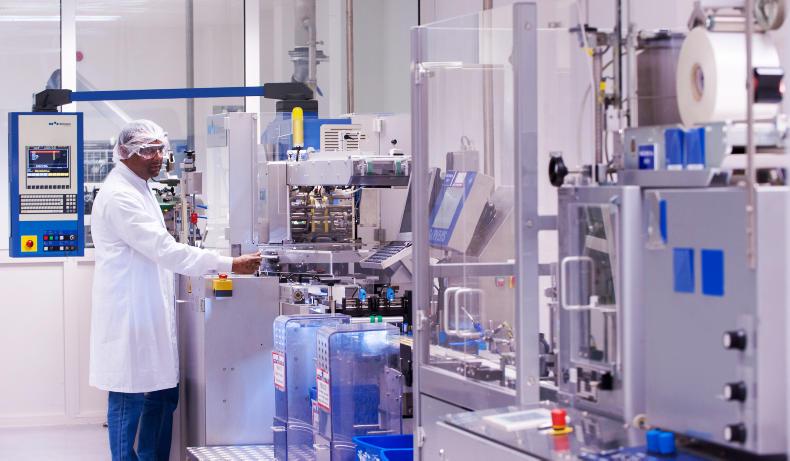
The company employs around 75 people to work on new product development from five specialised R&D laboratories.
“On the veterinary side alone, we’ll launch 44 new products over the next four years,” he says.
For Burke, R&D is as much about experience as it is about the simple cash investment. He says R&D know-how is something you learn over 15 or 20 years of experience.
“You can’t just go in and start doing R&D. It’s something that takes years of experience.
“Our head of R&D in veterinary has over 30 years of research experience so they know what to look for. It’s like someone with no experience trying to start out as a farmer. You need experience for the job and it takes years to learn the ropes,” explains Burke.
Antimicrobial resistance
On the issue of antimicrobial resistance (AMR) and antibiotic use in animals, Burke says it’s a huge issue but one that can be tackled effectively with better controls.
“If you look at France, Denmark, Sweden or the other Scandinavian countries over the last four or five years, governments there have done a good job to control the use of antibiotics. Antibiotic usage in animals has been reduced by 60%,” says Burke.
You can’t just go in and start doing R&D ... it’s like someone with no experience trying to start out as a farmer ... it takes years to learn the ropes
“In New Zealand, the government hopes to make farming antibiotic-free within the next five years.
“I don’t think you can become fully free from using antibiotics in animals as there will always be a 5% to 10% requirement. But that’s what their plan is,” he says.
Reducing antibiotic use in animals is not only good for human health but also for that of the animal, as they will become more disease-resistant without blanket antibiotics, says Burke.
Despite the many challenges, Burke believes the future for Irish vets is very bright, with the veterinary industry experiencing 5% growth over the last six months.
“The growing global population is increasing the demand for food so I think the future is very bright for new vets coming out of college,” he says.
However, Burke says the focus of animal health, similar to human healthcare, is shifting more and more towards preventative medicine, with the large multinational groups increasingly focusing their investment capital in this space.
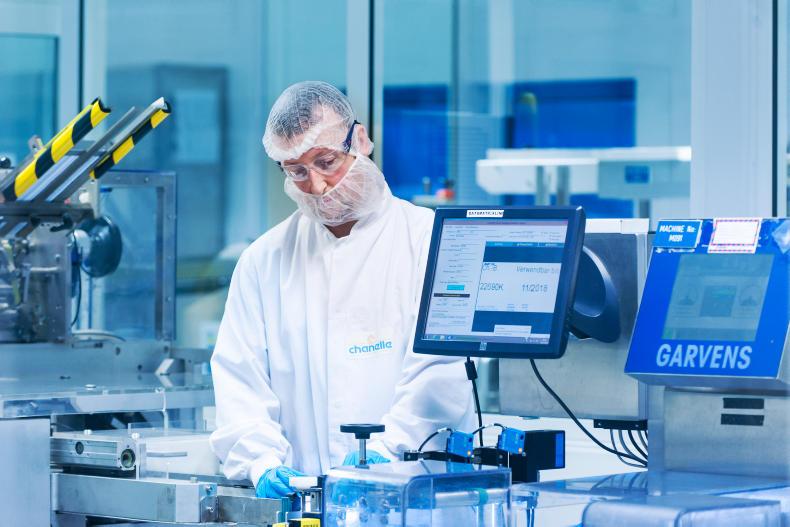
In light of Brexit, Burke says companies need to get on the ground in new markets.
Market diversification
What’s most striking about Chanelle is the international reach of the business, with exports to almost 100 markets around the world.
When asked what advice he would have for Irish food companies looking to diversify away from the UK in light of Brexit, Burke says companies need to get on the ground in new markets.
“I would say to companies they need to go visit new markets in Europe or wherever and start knocking on doors. When I was building this business I just went where I saw opportunity. I got on a plane and went to the market and developed the business from there,” says Burke.
Testament to that strategy, Burke says he is not worried hugely about Brexit because, while the UK is a big market for the company, countries such as France, Spain, Italy and Germany are all larger sales markets for the company.
“The UK is a good market for us but there are other countries in Europe that are bigger for us. We’re fortunate because once we started we went international,” he adds.
Although Burke will turn 71 this year, the Galwayman shows no signs of slowing down.
“I’m still very hands-on in the business because I get a kick out of it. I started this business from nothing but it’s all about having belief in your own ability and make sure you have a clear strategy,” he says.
“My vision for the business is very clear in that we want to continue to grow. We have a brilliant pipeline and will launch something like 90 new products over the next five years.”
Read more
David Kelly is back at Chanelle
Having worked as a vet for more than a decade alongside local farmers in his native Loughrea, Michael Burke spotted a gap in the Irish veterinary market in the early 1980s and backed himself to build a new business, despite having a very young family of five kids at a time when the Irish economy was in stagnation.
What Burke noticed was that a vet ordering a product from a multinational supplier could be left waiting for over a month to get it.
Burke established a new wholesale business on the main street in Loughrea, which was able to offer Irish vets delivery within 24 hours of placing an order. However, he was not prepared to stop there.
In 1985, Burke took his biggest risk when he established his first manufacturing facility on the outskirts of Loughrea making his own generic animal health products, based on medicines that have gone off patent. From these humble beginnings, the Chanelle Group has grown.
Global outlook
While very much a local success story (Chanelle Group carries the blue and yellow of the Loughrea GAA team), Chanelle is undoubtedly a company with a global outlook.
We develop a minimum of 15 to 20 generic products every year, whereas the multinational companies are developing just one or two products a year. On the veterinary side alone, we’ll launch 44 new products over the next four years
Still privately owned by Michael Burke, Chanelle Group today employs over 500 people across the business and exports to 96 countries around the world, with sales set to hit €130m this year.
“We’ve doubled our turnover in the last five years and we’ll double it again in the next five,” says Burke.
“Our focus on R&D is what’s driving this growth. We spend between €8m and €9m every year on R&D. And while that’s a big investment that comes straight off the bottom line, we have a brilliant pipeline of products coming through in the years ahead.”

The EU accounts for 80% of the group’s business, with small-animal products accounting for 50% of veterinary product sales.
Licensed products
Chanelle holds more than 2,000 animal health licences registered in the EU, which is the largest number held by any company in Europe, and more than 500 licences outside the EU.
The company is best known to farmers for its wide range of animal health products, including brands such as Albex, Animec Pour On, Bovex, Epromec, Rumenil, Chan Broad Spec, Ridafluke and Tribex. While manufacturing generic products for large animals is still a core part of Chanelle’s business, Burke says there has been huge growth in demand for small-animal health products. Sales of small-animal products now account for about 50% of total veterinary product sales.
While the EU accounts for 80% of the group’s business, markets such as Australia, New Zealand, Japan, South Africa and the Middle East are also important to Chanelle.
In the coming years, Burke is planning a major assault on the US market, having recently completed a €70m investment in expanding the company’s manufacturing capacity at the group’s 17.5ac site in Loughrea, as well as on new product development.
While Chanelle started out manufacturing generic animal health products, the company has since moved into the human health market. The global market for animal health products is valued at €25bn per annum, while the human health market is valued 50 times larger between €1.3tn and €1.4tn.
R&D pipeline
The focus on research and development in Chanelle is relentless. The company employs around 75 people to work on new product development from five specialised R&D laboratories, four of which are in Loughrea, with the fifth located in Jordan in the Middle East.
“R&D is a big focus for us because if we don’t have new products we’ll go nowhere,” says Burke.
“We develop a minimum of 15 to 20 generic products every year, whereas the multinational companies are developing just one or two products a year.

The company employs around 75 people to work on new product development from five specialised R&D laboratories.
“On the veterinary side alone, we’ll launch 44 new products over the next four years,” he says.
For Burke, R&D is as much about experience as it is about the simple cash investment. He says R&D know-how is something you learn over 15 or 20 years of experience.
“You can’t just go in and start doing R&D. It’s something that takes years of experience.
“Our head of R&D in veterinary has over 30 years of research experience so they know what to look for. It’s like someone with no experience trying to start out as a farmer. You need experience for the job and it takes years to learn the ropes,” explains Burke.
Antimicrobial resistance
On the issue of antimicrobial resistance (AMR) and antibiotic use in animals, Burke says it’s a huge issue but one that can be tackled effectively with better controls.
“If you look at France, Denmark, Sweden or the other Scandinavian countries over the last four or five years, governments there have done a good job to control the use of antibiotics. Antibiotic usage in animals has been reduced by 60%,” says Burke.
You can’t just go in and start doing R&D ... it’s like someone with no experience trying to start out as a farmer ... it takes years to learn the ropes
“In New Zealand, the government hopes to make farming antibiotic-free within the next five years.
“I don’t think you can become fully free from using antibiotics in animals as there will always be a 5% to 10% requirement. But that’s what their plan is,” he says.
Reducing antibiotic use in animals is not only good for human health but also for that of the animal, as they will become more disease-resistant without blanket antibiotics, says Burke.
Despite the many challenges, Burke believes the future for Irish vets is very bright, with the veterinary industry experiencing 5% growth over the last six months.
“The growing global population is increasing the demand for food so I think the future is very bright for new vets coming out of college,” he says.
However, Burke says the focus of animal health, similar to human healthcare, is shifting more and more towards preventative medicine, with the large multinational groups increasingly focusing their investment capital in this space.

In light of Brexit, Burke says companies need to get on the ground in new markets.
Market diversification
What’s most striking about Chanelle is the international reach of the business, with exports to almost 100 markets around the world.
When asked what advice he would have for Irish food companies looking to diversify away from the UK in light of Brexit, Burke says companies need to get on the ground in new markets.
“I would say to companies they need to go visit new markets in Europe or wherever and start knocking on doors. When I was building this business I just went where I saw opportunity. I got on a plane and went to the market and developed the business from there,” says Burke.
Testament to that strategy, Burke says he is not worried hugely about Brexit because, while the UK is a big market for the company, countries such as France, Spain, Italy and Germany are all larger sales markets for the company.
“The UK is a good market for us but there are other countries in Europe that are bigger for us. We’re fortunate because once we started we went international,” he adds.
Although Burke will turn 71 this year, the Galwayman shows no signs of slowing down.
“I’m still very hands-on in the business because I get a kick out of it. I started this business from nothing but it’s all about having belief in your own ability and make sure you have a clear strategy,” he says.
“My vision for the business is very clear in that we want to continue to grow. We have a brilliant pipeline and will launch something like 90 new products over the next five years.”
Read more
David Kelly is back at Chanelle







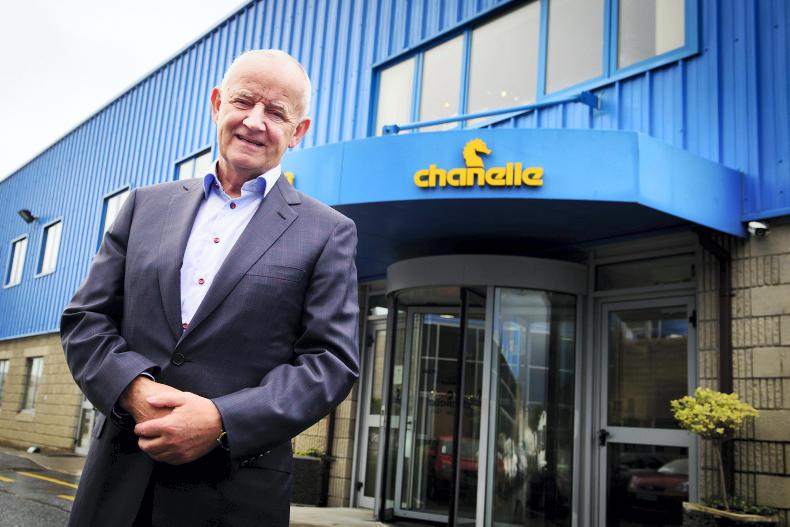
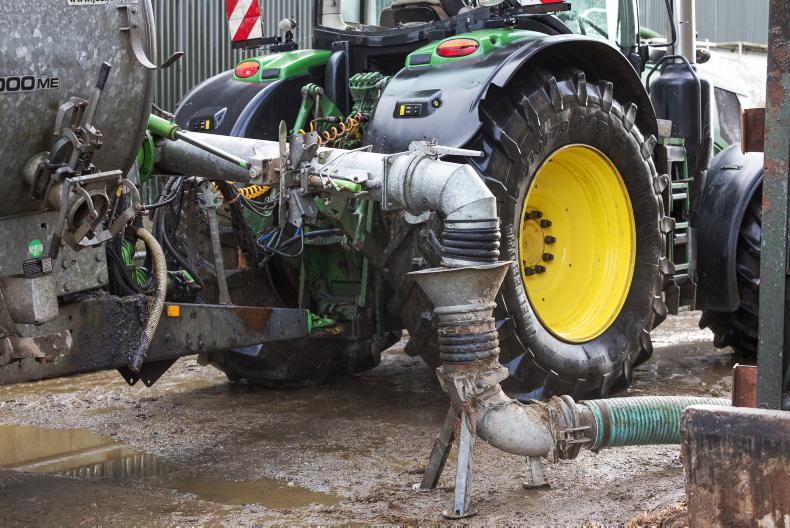
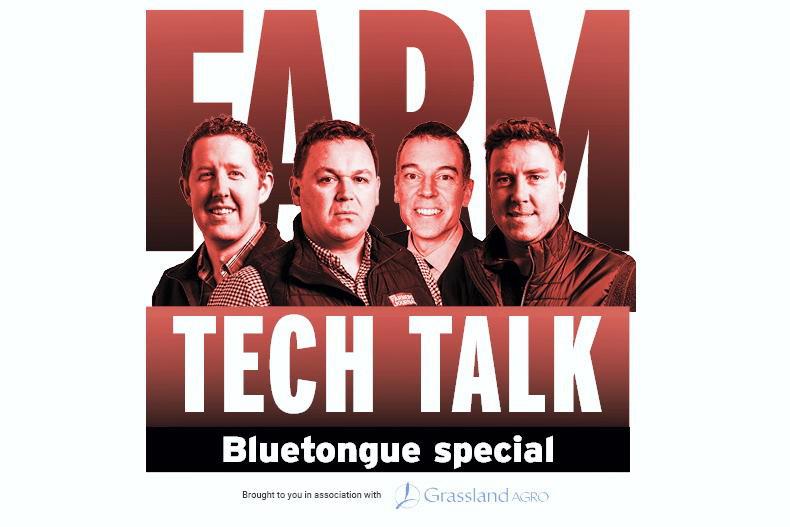
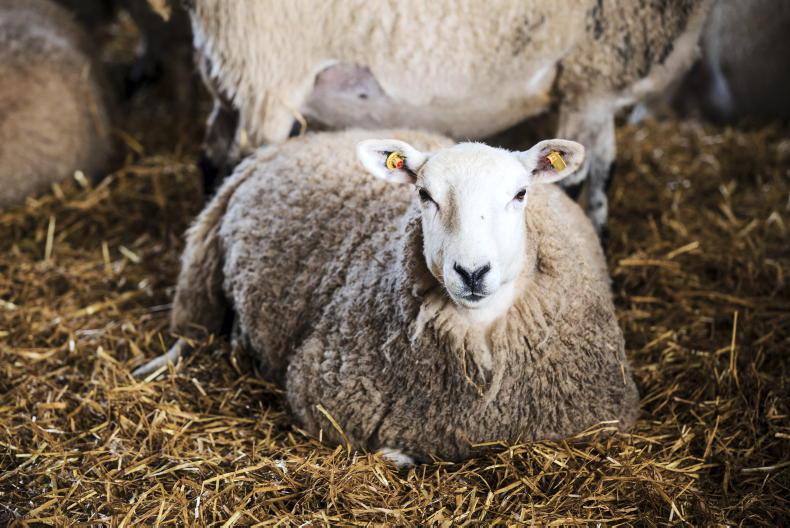
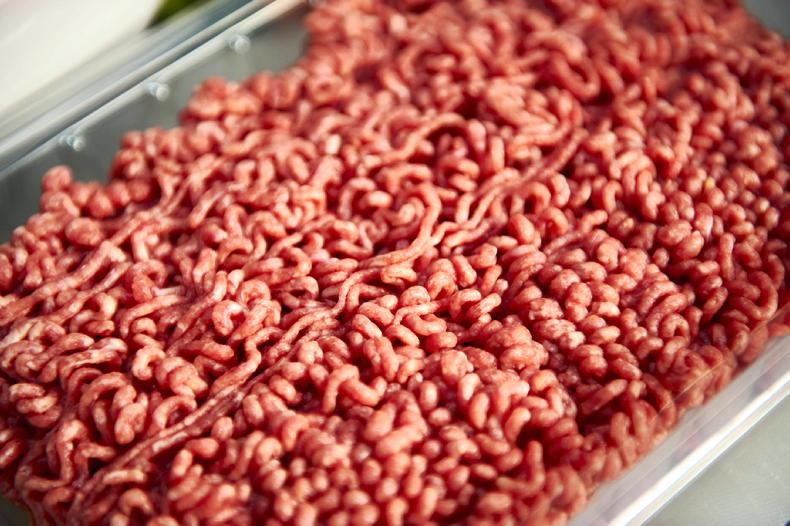
SHARING OPTIONS